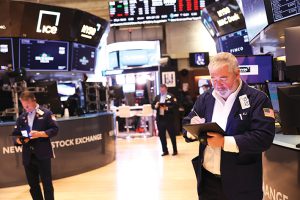BLOOMBERG
Global equities posted modest moves at the start of a busy week of economic data and central bank meetings that will test optimism among investors that interest rates will soon head lower.
The yen extended its losses to 1% after Bloomberg News reported that Bank of Japan officials see little need to rush into scrapping the world’s last negative interest rate, as they haven’t seen enough evidence of wage growth that would support sustainable inflation. The dollar strengthened against most of its major peers, while Treasury 10-year yields rose three basis points to 4.25%.
Traders are looking ahead to US inflation data on Tuesday, a Federal Reserve policy decision on Wednesday and retail sales numbers on Thursday. Policy decisions at the European Central Bank and Bank of England add to a crowded calendar.
“This should also be the last busy week for the year after which we enter into the holiday illiquidity period,” said Mohit Kumar, chief European economist at Jefferies International. “Even though central banks are likely to push back on rate cuts, we do not see a sharp rise in rates which would derail the upward momentum.”
European stocks and US futures contracts were little changed, as was a gauge of Asian equities. Earlier, Chinese stocks swung to a gain with a spike in volumes for an exchange-traded fund tracking state-owned shares fuelling speculation of buying by state funds.
Sentiment may also have been boosted after local media reported a Chinese macro hedge fund said the nation’s stock market is now offering a “once-in-20-year opportunity.”
China’s shares had dropped after a report published showed consumer prices fell at the steepest pace in three years while producer costs dropped even further into negative territory, underscoring the challenges facing the economic recovery.
Avoiding Recession
The S&P 500 capped a sixth week of gains on Friday, its longest winning run since November 2019, after solid payroll data backed speculation the world’s largest economy will be able to avoid a recession. Swap contracts now show a 40% probability the Fed will cut rates in March, down from more than 50% prior to the economic data.
Softening US inflation and employment data in the past month have convinced investors that the Fed is done raising rates and ignited bets that cuts of at least 125 basis points were in store over the next 12 months. Traders scaled back those wagers to about 110 basis points of easing after the nonfarm payrolls data.
“US economic data will need to walk a fine line in the coming months to sustain the recent rally,” said Mark Haefele, chief investment officer at UBS Global Wealth Management. “While we expect stocks to sustain recent gains and advance modestly higher in 2024, equity markets are already pricing in plenty of good news.”
Oil edged higher after its longest weekly losing streak in five years driven by signs that supply is starting to run ahead of demand. Bitcoin delivered another bout of its notorious volatility in a brief but sharp tumble toward $40,000 amid a broader crypto selloff. The largest token sank as much as 7.5% to $40,521 before paring some of the losses. Bitcoin has rallied this year on expectations that regulators will give the green light for the first US exchange-traded funds investing directly in the token.
 The Gulf Time Newspaper One of the finest business newspapers in the UAE brought to you by our professional writers and editors.
The Gulf Time Newspaper One of the finest business newspapers in the UAE brought to you by our professional writers and editors.
